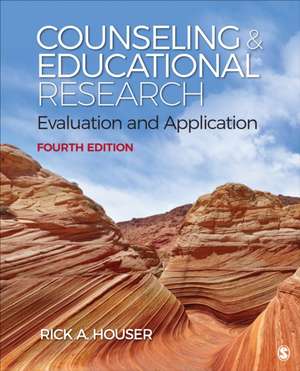Counseling and Educational Research: Evaluation and Application
Autor Rick A. Houseren Limba Engleză Paperback – 30 iun 2019
Preț: 815.96 lei
Preț vechi: 1102.65 lei
-26% Nou
156.15€ • 161.32$ • 129.96£
Carte disponibilă
Livrare economică 04-18 martie
Livrare express 15-21 februarie pentru 37.47 lei
Specificații
ISBN-10: 1544305060
Pagini: 416
Dimensiuni: 187 x 232 x 30 mm
Greutate: 0.73 kg
Ediția:Revizuită
Editura: SAGE Publications
Colecția Sage Publications, Inc
Locul publicării:Thousand Oaks, United States
Cuprins
Preface
Acknowledgments
About the Author
Section 1: Introduction to the Research Process
Chapter 1. Science and the Research Process
Definitions of Science and Research
Practitioner–Scientist
Assumptions About Science and Research
Plagiarism
Steps in the Scientific Process
Purpose and Overview of the Text
Chapter 2. Ethics and Research
Ethical Principles and Guidelines
Ethical Research Violations
Guidelines and Questions for Evaluating the Research Literature for Ethical Concerns
Evaluation of Research Examples Presented in the Professional Literature
Tuskegee Syphilis Study
Milgram Study
Chapter 3. Quantitative Research Designs
Strengths and Weaknesses of Quantitative Research
Types of Variables
Research Designs
Chapter 4. Qualitative Research Methods
Advantages and Disadvantages of Qualitative Research
Traditions or Paradigms in Conducting Qualitative Research
Case Study Approach
Chapter 5. Mixed Methods Research
History of Mixed Methods Research
Strengths and Weaknesses of Mixed Methods Research
Triangulation
Mixed Research Models
Chapter 6. Single-Case or Single-Subject Research
Guidelines and Procedures in Single-Subject Design
Research Designs in Single-Case or Subject Research
Chapter 7. Basics of Statistical Methods
Measurement Scales
Common Statistical Definitions
Descriptive Statistics
Inferential Statistics
Nonparametric Statistics
Chapter 8. Basics of Qualitative Research Data Analysis
Generating Data: Units of Data Collection
Organizing Data
Management of Data: Coding and Reducing
Interpreting and Reporting
Section II: Evaluating Articles in the Professional Literature
Chapter 9. Evaluating the Literature Review
Guidelines and Questions for Evaluating Research
Evaluation of Examples From the Research Literature
Chapter 10. Evaluating the Purpose Statement and Hypotheses
Guidelines and Questions for Evaluating the Purpose Statement
Evaluation of Examples From the Research Literature
Section Summary
Quantitative Research Hypotheses
Indirect Proof: An Orientation to the Scientific Approach
Types of Hypotheses
Guidelines and Questions for Evaluating Hypotheses: Quantitative Methods
Evaluation of Examples From the Research Literature
Evaluating a Hypothesis in Qualitative Research Methods
Guidelines and Questions for Evaluating Hypothesis or Hypotheses for Qualitative Research
Chapter 11. Evaluating the Methods Section—Sampling Methods
Sampling Methods Used in Quantitative Research
Guidelines and Questions for Evaluating the Methods Section Sample
Evaluating Examples From the Research Literature
Chapter 12. Evaluating the Methods Section—Instruments
Standardization of Instruments
Culture, Gender, and Diversity Bias
Reliability of Instruments
Validity of Instruments
Approaches to Measuring the Dependent Variable
Guidelines and Questions for Evaluating the Instruments—Quantitative Research
Evaluating Examples From the Research Literature—Quantitative Research
Guidelines and Questions for Evaluating the Instruments—Qualitative Research
Evaluating Single-Subject Research
Chapter 13. Evaluating the Methods Section—Procedures
Description of Study Variables
Random Assignment
Internal and External Validity
Threats to Internal Validity
Threats to Validity with Single-Subject Studies
Threats to External Validity
Evaluation of Procedures Examples From the Literature
Chapter 14. Evaluating the Results Section
Part I: Quantitative Research Results
Descriptive Statistics
Inferential Statistics
Guidelines and Questions for Evaluating the Results Section—Quantitative Research
Evaluating Examples From the Research Literature—Quantitative Research
Single Case Study Example
Part II: Qualitative Research Results
Coding Data: Data Analysis
Guidelines and Questions for Evaluating the Results Section—Qualitative Research
Evaluating an Example From the Results Section—Qualitative Research
Chapter 15. Evaluating the Discussion Section
Guidelines and Questions for Evaluating the Discussion Section
Evaluating Examples From the Research Literature
Single-Subject Case Example
Section III: The Application of Research and Evaluation
Chapter 16. Evidence-Based Research and Application
Counseling Meta-Analyses
Interventions in Schools
Integrative Reviews
Chapter 17. Conducting Research: Cultural Issues
Cultural Neuroscience Research
Examples of Cultural and Neuroscience Research
Chapter 18. Developing a Research Proposal and Conducting Research in Practice
Practitioner–Researchers
Developing a Research Proposal
Practical Considerations in Conducting Research
Chapter 19. Development and Application of Program Evaluation Research
Definitions of Program Evaluation Research
Professional Standards and Guidelines for Program Evaluation
Types of Evaluation
Evaluation Models
Steps in an Evaluation
Examples of Program Evaluation
Chapter 20. Advances in Technology and Research
Technologies
Online Counseling
Interactive Video
Bug-in-Ear Technology
iPads and iPhones
Virtual Reality
Neuroscience Technologies
Chapter 21. Current and Future Issues in Counseling and Educational Research
The Practitioner–Scientist Model
The Relevance of Research to Practice
Value Issues in Counseling
Social Justice Issues
Glossary
References
Index
Notă biografică
Rick Houser is Professor Emeritus Department of Educational Studies in Psychology, Research Methodology & Counseling, College of Education at The University of Alabama. He was Professor and Department Head in Educational Studies in Psychology (over 7 years at Department Head), Research Methodology, and Counseling at The University of Alabama. He has been Associate Dean in the College of Education at the University of Massachusetts, Boston. Also, he was a professor and department chair for several years at the University of Massachusetts, Boston. Rick Houser has taught graduate-level research courses for more than 30 years. He received his doctorate from the University of Pittsburgh in rehabilitation counseling with a minor in research methodology. He conducts research in ethical decision making, stress and coping, educational neuroscience, and neuroscience and counseling.
